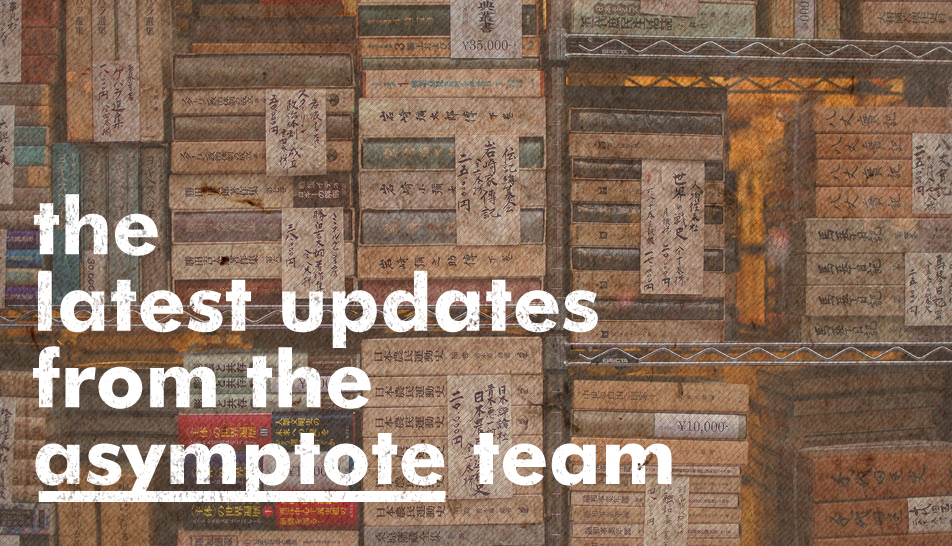As you might remember, we recently announced Close Approximations, our $4,500 translation contest judged by Michael Hofmann, Ottilie Mulzet, and Margaret Jull Costa. But we have more exciting news for you: Our podcast and annual reader survey are back! And to prepare for new ventures, we’re hoping to enlist new team members via our final recruitment drive of the year (deadline: 1 September 2015). Check out the details here: READ MORE…
3 Asymptote Announcements (You Don’t Want to Miss)
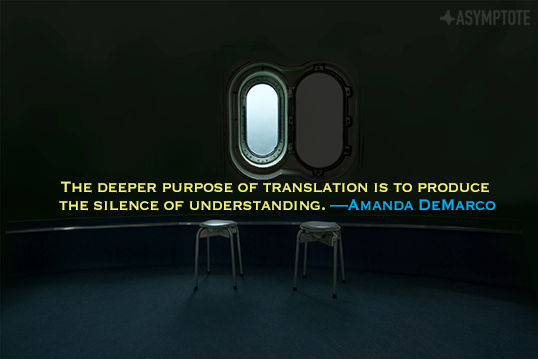
After announcing Close Approximations, our $4,500 translation contest, we're thrilled to share more exciting news!
The Uncanny Listener: Stories from the Shadows (Part 1)

Our newest podcast episode features creepy stories by Bruno Schulz, Ambrose Bierce, John Herdman and Felisberto Hernandez.
The Uncanny Listener: Stories from the Shadows (Part 1)
Podcast: Play in new window | Download
Subscribe: iTunes | Android | RSS
What exactly is “the uncanny“? We’ve all felt the sensation of a bloodcurdling shiver running down our spines, but when it comes to describing what that means or what caused it, we’re often left with nothing but: “it was just . . . creepy.”
In the latest episode of the Asymptote Podcast, we explore the mysterious and alluring phenomenon of getting the creeps, through the words of some of the best scary-storytellers in world literature. The Uncanny Listener: Stories from the Shadows is a chilling collage of readings that reveal the strangeness of what’s familiar and the familiarity of what’s strange. READ MORE…
Translating Borges into Trees: An Interview with Book Artist Katie Holten
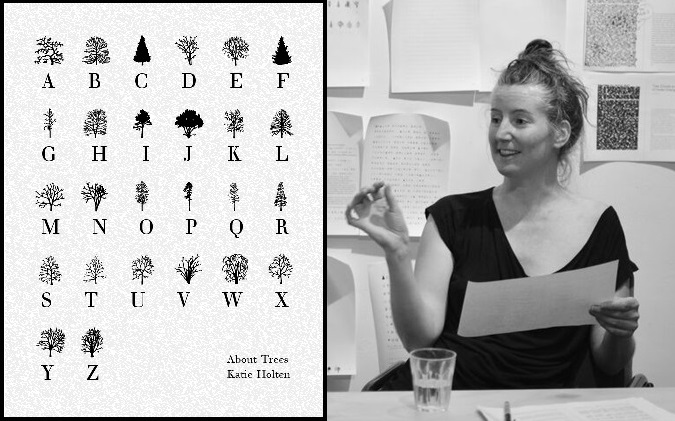
"I think of the book as an archive of human knowledge filtered through branches of thought."
Katie Holten is an Irish artist. She represented Ireland at the 50th Venice Biennale. Solo museum exhibitions include New Orleans Museum of Art (2012); Dublin City Gallery The Hugh Lane (2010); The Bronx Museum, New York (2009); Nevada Museum of Art, Reno (2008), and Contemporary Art Museum St. Louis (2007). Committed to social causes, especially as they pertain to environmental issues, Katie is fascinated with the inextricable relationship between man and the natural world in the age of the Anthropocene. She is the artist behind About Trees, the first book in Broken Dimanche Press’s new series Parapoetics: A Literature Beyond the Human. Her artwork can be found at katieholten.com.
***
Asymptote: How would you describe About Trees to someone who hasn’t heard of the project?
Katie Holten: About Trees is a book about trees written in trees. It’s a collection of texts about trees, about the notion of trees, and a constellation of tangential tree-related things. Everything is translated into Trees, a new typeface that I made especially for the project. At the core of the book is a Tree Alphabet with trees replacing each of the 26 letters of the standard English/Latin alphabet. These characters were transformed into a font, the typeface called Trees. READ MORE…
Translator’s Profile: K. E. Semmel
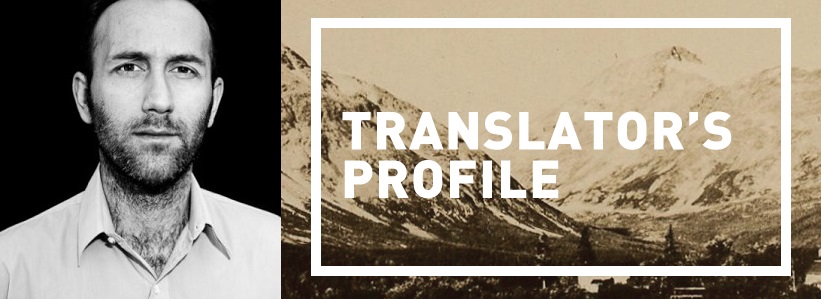
Q&A with K. E. Semmel, translator from the Danish and 2016 NEA Literary Translation Fellow.
K. E. Semmel is a writer and translator whose work has appeared in Ontario Review, Washington Post, World Literature Today, Southern Review, Subtropics, and elsewhere. His translations include books by Naja Marie Aidt, Karin Fossum, Erik Valeur, Jussi Adler Olsen, Simon Fruelund and, forthcoming in winter 2016, Jesper Bugge Kold. He is a recipient of numerous grants from the Danish Arts Foundation and is a 2016 NEA Literary Translation Fellow.
***
Who are you? What do you translate?
First, thank you for asking me to do this interview. I’ve started an interview series with the Santa Fe Writers Project (SFWP) called “Translator’s Cut,” in which I travel the globe, so to speak, interviewing translators about their work. So I’m more used to being on the opposite side of an interview.
Who am I? I’m a literary translator and writer, working from Danish to English (though I’ve translated some Norwegian and would do it again if the right opportunity presented itself). My educational background is in History and Literature, and my professional background is in the nonprofit world. For the past couple years, however, I’ve been translating full time. Like with any translator, I suspect, my primary reason for translating is that I love books and literature and want everyone to experience some really fantastic books that I happen to be able to render in English. READ MORE…
Translation Tuesday: “Mal Paso” by Hugo López Araiza Bravo

Spanish/French/English—a multilingual Translation Tuesday, translated by criticism editor Ellen Jones
Select translation:
“But why do you want to go to Haiti?” they asked her in Santo Domingo. “You crazy?”
She only smiled like a naïve foreigner, mumbled something about a sociolinguistic interest in the borderlands, and went out of the department with her Lotman under her arm. While she waited for the bus to the coach station she looked over the timetable that her classmates had reluctantly given her. It was going to take the whole day. The first thing she had to do was leave the city by the Carretera Sánchez.
“I’m only going as far as Barahona,” the driver warned her when he heard where she was going. “From there, you’re on your own.”
She didn’t mind. She sat on the left hand side so she could say goodbye to the sea; she fixed her eyes on the waves while the vehicle moved over the concrete. The blue was giving way little by little to green. When nothing but mountains was visible, she fell asleep. She woke up just in time to see the Arco del Triunfo.
She had a hard time finding someone to take her the rest of the way. Finally she ended up with a lorry driver whose job was to supply sugar cane to the city’s sugar factory. He was loading his vehicle with big water bottles.
“There’s not enough water over there,” he explained. “I’m going to make more on this trip than I make in a month going back and forth like crazy.”
They set off when the driver was sure that he’d made use of every cubic metre of his hold. They left the city behind and went into the sugar plantations. The lorry’s cabin shook with a wave of vituperation against the sugar industry. How they were worked from sun up to sun down. How bateyes still existed. How people were dying from machete wounds. How even after everything slavery still persisted, it’s just that now they called it minimum wage. Then the Laguna del Rincón appeared, and the criticism was directed towards uncontrolled fishing and the loss of heritage as a result of greed.
“They extract gypsum from that mountain,” he concluded signaling towards the other side. “Don’t get me started on the mines.”
She didn’t. She wasn’t about to get involved in ethical debates with a man who was trying to sell water at the price of mercury to the victims of an earthquake. Besides, enough people had confided in her their misfortunes for her to know that all of Latin America was singing from the same song sheet: each country had its own versions of the same general ills.
They stopped in Duvergé for something to eat: rice and pigeon peas. As soon as their plates were clean her companion stood up.
“We’ve got to get to Jimaní before nightfall: it’ll be hard to find somewhere to spend the night.”
They could barely make out the city when it became clear that something was out of the ordinairy. It was seething. For the second biggest cité in the municipalité, there were too many people. And people in the streets. They had to réduice their speed to avoid running someone over. They soon understood that they were principalment refugees. They stopped in front of a house d’aspect humble.
“They’re distant relatives” her guide excused himself. “Tomorrow you can go to the border. It’s only two kilometres away.”
She passéd the nuit on a pallet in the cuisine.
She sortied early, with only a piece of manioc in her estomac. She calculated that she’d have to marche for three quarts of an hour. The streets were as full as the précéding nuit. The soldats from the Fortaleza looked suspicieusely at the people going past. She commenced to move between the multitudes, parfaitly aware that she was swimming à countercurrent. Quand she left the last houses behind, the route became more sauvage. Elle décida to walk on one side so it would be more facile to mouve. Those who were coming in the opposée direction looked like they hadn’t eaten in days. They came with almost zéro, with seulely the robes they were wearing quand tout had se passé. On her right était the Étang Saumâtre, et elle imagina that if the dominicain gouvernment had not permetted the réfugiés to entrer, these waters would now be full de illegaux swimming pour their survie.
Elle could déjà see Mal Paso. Le nom was apt: négliged constructions that spat out misérables, infernal portes. She made her way à travers the réfugiés et entréed a totalement chaótique square. There were pleine de gens en the mouve, here et là camions could be seen, still trying to continuer with their commerce. Among them were the improviséd campements for those who still pensaient que they pourraient retourn. Elle parcrossed le perimetre lentement, completely submergéed. Vraiment Mallepasse. Elle vint more proche à la frontière. Un point de contrôle de Casques Bleus garded le passage.
“Eh! La fille!”, lui hurla l’un des soldats. “Tu peux pas passer! Rien que de l’aide internationale y peut traverser! C’est pas du tourisme, une catastrophe pareille!”
Elle resta immobile. De l’autre côté, elle vit l’Ayiti. Tout te sanble diferan de lót bò a.
–¿Pero por qué tú quieres ir a Haití? –le preguntaron en Santo Domingo–. ¿Estarás tú loca?
Ella sólo sonrió cual extranjera ingenua, balbució algo sobre el interés sociolingüístico de la frontera y salió de la facultad con su Lotman bajo el brazo. Mientras esperaba la guagua hacia la central de autobuses repasó el itinerario que a regañadientes le habían dado sus compañeros. Le iba a ocupar todo el día. Lo primero que tenía que hacer era salir de la ciudad por la Carretera Sánchez.
–Yo voy sólo hasta Barahona –le advirtió el conductor cuando se enteró de su destino–. A partir de ahí, se ampara sola.
No le importó. Se sentó del lado izquierdo para poder despedirse del mar; clavó los ojos en las olas mientras la máquina avanzaba por el concreto. El azul fue cediendo poco a poco al verde. Cuando no se distinguía más que monte, cayó dormida. Despertó justo a tiempo para ver el Arco del Triunfo.
Le costó trabajo encontrar quién la llevara el resto del camino. Finalmente dio con un camionero encargado de abastecer de caña al ingenio de la ciudad. Estaba cargando su vehículo con garrafones.
–Allá hace falta el agua –explicó–. Voy a hacer más con este viaje de lo que gano en un mes dando vueltas como loco.
Partieron cuando el conductor estuvo seguro de que cada metro cúbico de su caja estaba aprovechado. Dejaron detrás la ciudad y se adentraron en los cañaverales. La cabina del camión se removió con un vendaval de vituperios al sistema azucarero. Que se trabajaba de sol a sol. Que seguía existiendo la raya. Que la gente moría de una herida de machete. Que después de todo se mantenía la esclavitud, aunque ahora le dijeran salario mínimo. Entonces emergió la Laguna del Rincón, y la queja se dirigió hacia la pesca indiscriminada y la pérdida del patrimonio por culpa de la avaricia.
–De ese monte sacan yeso –concluyó señalando hacia el otro lado–. No me haga comenzar con las minas.
No lo hizo. No estaba para meterse en debates éticos con un hombre que pretendía venderles agua a precio de mercurio a los damnificados de un terremoto. Además, ya había protagonizado suficientes confidencias de desgracias como para saber que toda Latinoamérica cojea del mismo pie: cada país tiene sus propias versiones de los males generales.
Pararon en Duvergé por algo de comida: arroz con guandules. En cuanto limpiaron el plato su compañero se paró.
–Hay que llegar a Jimaní antes que anochezca: nos va a costar trabajo encontrar dónde pasar la noche.
Apenas divisaron la ciudad se dio cuenta de que algo había fuera de lo commún. Bullía. Para ser la segunda ciutat más grande del municipio, le sobraba gent. Y gent en las calles. Tuvieron que diminuir la velocidad para evitar atropellar a alguien. Pronto comprendió que se trataba en su majoría de refugiados. Se detuvieron frente a una casa d’aspecto humilde.
–Son parientes lejanos –se excusó su guía–. Mañana tú podrás ir a la frontera. Está apenas a dos kilómetros.
Passó la noche en un catre en la cuisina.
Sortió temprano, sólo con un trozo de yuca en el ventre. Calculaba que devía marchar tres quartos de hora. Las calles estaban tan plenas como la noche précédente. Los soldats de the Fortaleza miraban méfiantes las gens que pasaban. Commenzó a moverse entre la multitude, parfaitamente consciente de que nadaba à contrecorriente. Quand dejó atrás las últimas casas, el chemino se devenió más agreste. Décidió andar par un lado, de sorte que le fuera más fácile déplazarse. Los que veníaent en sens contrairio paraîcían no aver mangiado en varios días. Veníaent casi sans nada, seul con las robes que portaban quand tout se avía passado. À su derecha étaiba el Étang Saumâtre, et se immaginó que si el gouverno dominicain no hubiera permis la entrée de refugiés, esas aguas serían ahora pleines de illegaux nageando pour la supervivencia.
Elle veía déjà Mal Paso. Lui iba bien el nom: unos bâtiments négligéados qui escupían misérables, unas portes al enfer. Se ouvrió paso à travers de los réfugiés et entró en une plaza totalement chaótique. Étaiba pleine de gens en mouvemiento, aquí et là se apréciaban los camions que avían todavía essayé continuer con el commerce. Entre eux étaiban les campaments improvisés de los que pensaient todavía que pourraient retournar. Parcourrió le pérímétre lentement, duramente impressionée. Vraiment Mallepasse. Elle vint más proche à la frontière. Un point de contrôle de Casques Bleus vigilait le passage.
«Eh! La fille!», lui hurla l’un des soldats. «Tu peux pas passer! Rien que de l’aide internationale y peut traverser! C’est pas du tourisme, une catastrophe pareille!»
Elle resta immobile. De l’autre côté, elle vit l’Ayiti. Tout te sanble diferan de lót bò a.
***
Hugo López Araiza Bravo is a Mexican writer and translator. His first book, Infinitas cosas, won the 4º Virtuality Literario Caza de Letras. His second will be out soon, and he's been shadow-boxing with a novel for over four years. In 2012, he won the Concurso 43 de Punto de Partida in literary translation, with a fragment of a novel by Amélie Nothomb. He's currently studying for a Masters in Translation at El Colegio de México. Ellen Jones edits the criticism section of Asymptote, and contributes the occasional translation. She has a B.A. in English literature and Spanish, and an M.St. in English Language from the University of Oxford. She is now a Ph.D. candidate at Queen Mary University of London, researching English-Spanish code-switching in contemporary fiction, and the particular challenges associated with reading, publishing, and translating this kind of writing.A Ming Dynasty vase and an ancient Greek urn share beauty but not aesthetics. The artisans of the different styles might have appreciated each other’s work—and yet they might have stuck to their own ways, perhaps because they saw no reason to change or perhaps because they simply lacked the material and equipment to produce anything else.
Languages also have different rules for beautiful prose, based both on cultural inheritance and on the possibilities and limits of each language within its grammar and vocabulary.
I translate Spanish to English, and I often face the delightful task of transforming beautiful Spanish prose into beautiful English prose. To do that, I have had to learn to appreciate the standards of beauty for each language, which share little in common due to different historical trajectories.
Spanish emerged from a local dialect of Latin. King Alfonso X the Wise, who reigned from 1252 to 1284, made Spanish (Castilian, to be precise) the preferred language for scholarship in his realm, replacing Latin. To cement that change, he funded scholars in Toledo and elsewhere to translate literature from other languages into Spanish and to write new books. He himself wrote some important works, knowing that a language must have literature. READ MORE…
Weekly News Roundup, 14th August 2015: the Books You Read, the Books You Ban

This week's literary highlights from across the world.
Hey, happiest of Fridays, Asymptote readers! Hope you’re enjoying what’s now—or about to be—the second half of August. For our readers in the United States, that might include a road trip, and what’s more American than a jaunt on the Interstate, as in Vladimir Nabokov’s famed Lolita? Over at the Literary Review, Nabokov falls for America. Or just stay at home, invite friends, open a bottle of wine, and chitchat about your latest favorite read—somehow. What, even, is the social function of the novel?
In Ukraine, that dinner conversation might include a list of books that no one around the table has read—as the country’s recently released a list of 38 banned books, all of which hail from Russian publishers and are deemed “hate” books. The whole thing is rather suspect, especially coupled with news that a Russian publisher has released several pro-Putin tomes using Western-sounding names.
In Japan, everyone’s favorite Nobel point of speculation/runner/baseball fan/novelist Haruki Murakami has published an eight-part e-book release of responses to the questions he had been asked in a crowdsourced, massively hyped advice column earlier this year. Italian anonymous phenom Elena Ferrante is of a slightly different slant when it comes to self-promotion, perhaps: before publishing her debut novel, Troubling Love, in 1991, she “made a small bet” with herself that “books, once they are published, have no need of their authors.” But we’re frothing at the mouth to meet you!
Trivia—more or less. You may have read French surrealist Mallarmé in the English translation (which one?), but have you read English in Mallarmé, Peter Manson’s erasurist, collaborative response? And have you wondered what the great English bard William Shakespeare may have been or possibly was smoking?
Finally, if your novel isn’t taking off yet, blame the trailer. You just don’t find them like this anymore.
Translator’s Profile: Susan Bernofsky
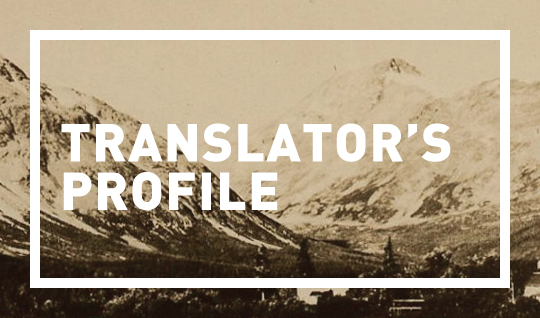
Q&A with Susan Bernofsky, translator from the German and Director of Literary Translation at Columbia University.
Susan Bernofsky directs the literary translation program in the School of the Arts MFA Program in Writing at Columbia University. She has translated over twenty books, including seven by the great Swiss-German modernist author Robert Walser, Kafka’s The Metamorphosis, Hesse’s Siddhartha and, most recently, The End of Days by Jenny Erpenbeck. Her many prizes and awards include a Guggenheim Fellowship this year, as well as the Helen and Kurt Wolff Translation Prize and the Hermann Hesse Translation Prize. She blogs about translation at www.translationista.net.
***
Asymptote: Describe your current/most recent project. Why is it cool? What should we know about it?
Susan Bernofsky: I’m working on a gorgeous and bizarre novel about polar bears by Yoko Tawada called ETUDES IN SNOW. It’s a three-generation story inspired by the short, tragic life of Knut, the baby polar bear born in the Berlin zoo in 2006, but that’s just the jumping-off point for her novel. It’s really a book about identity (national, species, etc.) All the main characters in the book are polar bears, and are described in their physicality as polar bears, but at the same time they move in human society, without any acknowledgment that there might be a contradiction here. The grandmother character, born in the Soviet Union, becomes a writer. As an author of polar bear extraction, she’s an ethnic minority. She later emigrates to Canada, from where her daughter returns to Europe, landing in East Germany, where she takes a job at a circus and experiences the fall of the Berlin Wall. It’s a funny, sad, moving book.
Review: Rock, Paper, Scissors by Naja Marie Aidt
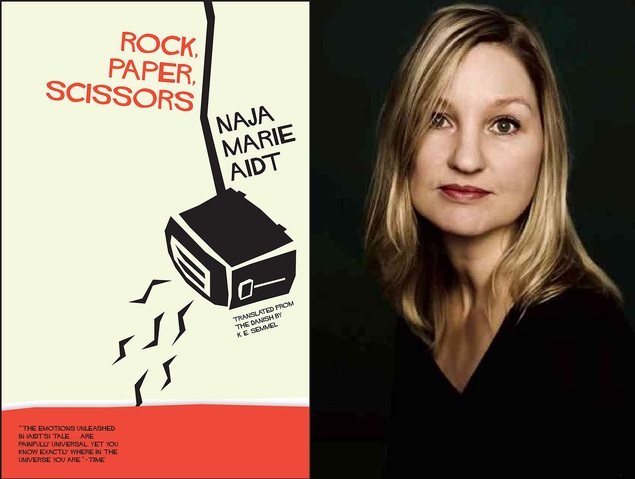
Our India editor-at-large reviews Naja Marie Aidt's long-awaited first novel.
See here a picture of prosperous urban life—clean, quiet, well organized, polite and considerate—now lift up the top and see the unfounded rage, the explosive violence, and the metaphysical distress bubbling just under that calm surface. This is what Danish poet and writer Naja Marie Aidt conveys to us in her latest novel, Rock, Paper, Scissors (Open Letter, 2015), translated from the Danish by K. E. Semmel.
Thomas O’Mally Lindström is a small business owner who lives in an upscale apartment with his girlfriend, Patricia. The novel begins with Thomas and his sister, Jenny, making arrangements for the funeral of their father, Jacques. We see Thomas as a man who has his life put together: he runs a successful stationary business with his partner, he’s in a relationship with an attractive, intelligent and kind woman, he is an affectionate brother to Jenny and a good uncle to her daughter, Alice. Thomas seems to have successfully left behind his poor, abusive childhood; in which he and Jenny had suffered at the hands of Jacques, a petty criminal and drug-pusher.
Things start to fall apart when Thomas, while helping his sister sort out Jacques’s things at his rundown apartment, finds a huge sum of money hidden in an old, broken toaster. Thomas decides to keep the money even though he knows his father probably came by it illegally. He hides the money in his basement; but it makes him sick with anxiety every time he thinks about it. At his father’s funeral a few days later, Thomas is surprised to find himself overcome with grief; he begins to sob uncontrollably when his sister Jenny hugs him after the service. The funeral is one among a number of great scenes—the generic service, the chapel’s “white walls, hard benches,” the tacky flowers, the awkward handshakes and nods, Jenny’s pretentious eulogy—all of it sets Thomas down a fresh spiral of panic. READ MORE…
Translation Tuesday: Multilingual Poems by Ann Cotten
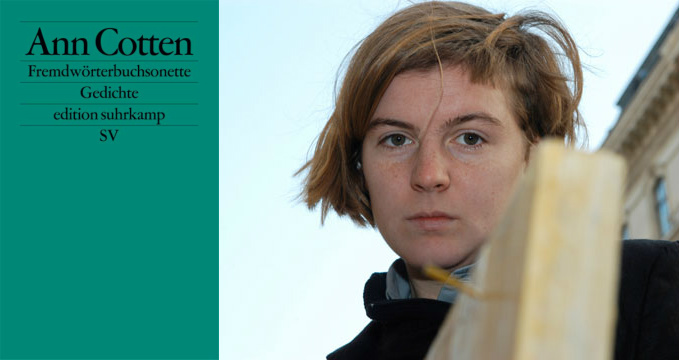
In honor of our July Issue, a super-special multilingual Translation Tuesday—Ann Cotten translates Ann Cotten, and back again!
Select translation:
nonesuch I (from Fremdwörterbuchsonette)
The ghost entered me like a kind of shirt.
It hung next to the dancefloor and was opposite
to all. That sounds a bit odd, not quite
credible, certainly I cannot say it right.
Something was backward in the whole construction
of what I happened to be working on.
Time seemed to have some purpose further on
with me, wrung me and couldn’t work it out.
And so I leant against the wall and smoked,
and watched the Russendisko on and on and smoked
too much. And I was much too bored to write.
Still not at all ill at ease, squandering my light
I thought of never going home to better-lighted dirt
and suddenly began to see the ghost in the shirt.
“O ghost,” spake I, “please understand my wonder!
I didn’t know that ghosts would deign to wander
casting their eyes perplexingly asunder,
in shirts, our fears and echoings to pander.”
The ghost just stared at me. A girl came over
and asked me for a light. My boyfriend came
and told me he was going home. It was the same
to me. I nodded, quite the midnight rover,
knowing myself to have become rather a dud,
my self’s long-empty shell, and how my words
rustled and shifted, like rice in gourds,
vague and conceited like smoke from a cigarette,
cold and precise like condensation.
And I awoke, as cold as ash, in my own tub.
***
nonesuch II (from Fremdwörterbuchsonette)
In my own tub I lay and dreamt of girls
who come around and ask you for a light.
Their little souls rotate inside their eyes
as my lighter renders them closer than the night
which is the reason why I love these rituals
in which the incomparables and I unite.
And all the while I know my cigarettes are all
exactly the same length, and they seem to invite
their and my own interconfoundability,
white, lightweight, full of discontent,
rattling and wheezing when they’re full of tea
and, taken, all desire just to be spent,
as air races through them, they wake the ghosts
and attract minutes, posted between the lips’ red boasts.
The ash upon the water forms a brittle film.
Mein Liebling, erklärst du dich zu meiner Giraffe,
verspreche ich, dass ich dich immer lachen mache.
The past has risen and is lapping at my chin.
Die Biber haben alle Bäume abgenagt, mein Lieber, sieh,
noch während wir hier stehen, beknabbern sie meine Knie.
The tap presses a lullaby into my nape,
the boiler hums a low and dismal tune,
I watch myself scratch myself like an ape,
and fall asleep into the arms of monster rune:
It isn’t realistic to be lying here.
In all the fog and damp time seems to override itself.
I cannot reach you, not with beer, nor animals, nor jokes;
everything runs out; the ghost of the night lives to side with itself, but chokes.
nonesuch I (from Fremdwörterbuchsonette)
Der Geist betrat mich wie eine Art Hemd.
Es hing am Rand der Tanzfläche und bildete
den Gegenpol zu allem. Das befremdet,
wirkt unerklärlich, wenn ichs schildere.
Es war etwas verkehrt an dem Gebilde,
an dem ich zu der Zeit gerade arbeitete;
die Zeit führte mit mir etwas im Schild,
wrang mein Gebein und kriegte es nicht raus.
Und so lehnte ich rauchend an der Wand,
schaute der Russendisko zu und rauchte
zu viel. Zum Schreiben war mir viel zu fad.
Ich war trotzdem nicht unzufrieden, dachte
entfernt daran, eher nicht heimzugehen,
plötzlich begann ich diesen Geist im Hemd zu sehen.
“O Geist,” sprach ich, “verstehe mein Befremden:
Ich wusste nicht, dass Geister auch in Hemden,
die großen Augen gegenteilig wendend,
Widerhall, Trost und Unbehagen spenden.”
Der Geist indessen starrte mich nur an.
Ein Mädchen kam zu mir und bat um Feuer.
Meine Begleitung kam und sagte, dass er heimgeht.
Ich nickte nur, als ging es mich nichts an:
Ich war schon lange nur mehr eine Panne,
die Schale meiner selbst, und ausgehöhlt
klimperten geistermäßig meine Worte,
vag und geziert wie Zigarettenrauch,
kalt und präzise wie Kondensation.
Ich wachte auf, wie Asche kalt, in meiner Badewanne.
***
nonesuch II (from Fremdwörterbuchsonette)
Ich badete und träumte von den Mädchen,
die herkommen und mich um Feuer bitten.
In ihren Augen rotiern ihre Seelchen
in meinem Feuerschein in kurzen Augenblicken.
Deswegen liebe ich ja diese Sitten,
in denen unvergleichlich sich vereinen
jene und ich. Und meine Zigaretten
sind glatt und alle gleich lang. Bescheinigen
sie ihre und meine Vertauschbarkeit,
weiß, leicht und voller Unzufriedenheit,
klappernd und rauschend, wenn sie altern,
und jung voller Verlangen, wenn der Atem
sie schnell durchzieht, so wecken sie die Geister,
binden künstelnd Minuten, an Lippen gekleistert.
Die Asche auf dem Wasser bildet einen Film.
My darling, if you will be my giraffe,
I’ll promise to do things to make you laugh.
Mir reicht Vergangenheit bis an mein Kinn.
The beavers, dear, have gnawed off all the trees,
and as you look at me they’re working on my knees.
Der Hahn drückt mir ein Schlaflied in den Nacken,
der Boiler summt den Bass betrübt und wüst,
ich schaue mir beim Dösen selbstgesprächig zu,
gleich wird das Brainmap mich mit den Tentakeln packen:
Es ist nicht realistisch, hier zu sitzen
im Dunst, im Nass hebt Zeit sich aus den Angeln.
Erreich dich nicht mit Tieren, nicht mit Witzen, es läuft aus und
der Geist der Nacht sitzt tief im letzten Gurgeln.
Defying Sameness: A Conversation With Danny Lawless of Plume

An in-depth look at Plume Poetry and Plume Anthology with Danny Lawless, editor-in-chief.
Alex Cigale: “Le jardin reste ouvert pour ceux qui l’ont aimé.” Plume’s motto is the concluding line of Jacques Prévert’s “Vainement.” Could you connect for us Plume’s literary influences with the spot you see Plume inhabiting on the poetry journal literary map?
Danny Lawless: Michaux, Prevert, Follain, Parra, Ponge. These, and so many others, are transformational apparitions from a world beyond my provincial one, growing up in Louisville, Kentucky.
There was Breton, of course, the most famous name, whose poetry I now think did not prosper in the shade of his political and artistic manifestos that descended into fiats and excommunications. But one proceeds by allusion, right? A sort of overhearing. So in the course of taking in all of Breton—I was persistent—I made the acquaintance of Desnos, Reverdy, Char.
The book that all but exploded in my hands was Benedikt’s The Poetry of Surrealism: An Anthology. And so I read these people for years and years—over four decades, and when it was time to begin work on what would become Plume, there was no question regarding what its “aesthetic” would be. And, I suppose, making Plume was an act of conservation, for these poets had fallen out of fashion, if they were ever in it, in the United States.
I wanted to introduce these voices to other readers, to connect with those who knew and loved them as I did. I thought if future contributors had read as I had (and I discovered many had), then we would be of like minds, sharing certain affinities and antipathies—that their work would be what I liked and admired, and that publishing it would be a pleasure. READ MORE…
Weekly News Roundup, 7th August 2015: Nah Nah Nah NEA!

This week's literary highlights from across the world
July Issue Highlight: “Excerpt” by Cia Rinne
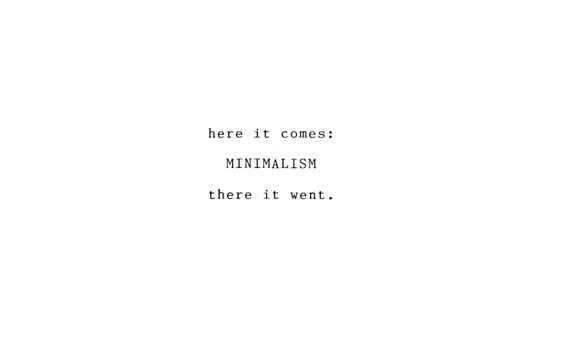
A look at one of our multilingual feature's star poems.
Contributing editor Aamer Hussein was interviewed by Kindle Magazine about his latest short story collection, 37 Bridges.
Poetry editor Aditi Machado‘s translation of Farid Tali’s Prosopopoeia has been accepted by Action Books for publication in Fall 2016.
Contributing editor Antony Shugaar has not one but two translations scheduled for publication in August: Nobel laureate Dario Fo’s The Pope’s Daughter (Europa Editions) and Fausto Brizzi’s 100 Days of Happiness: A Novel (Penguin Random House).
Over at his blog, contributing editor Adrian West weighs in on Rainald Goetz winning the Büchner Prize 2015—a controversial choice—and makes a case for Goetz’s relevance.
Drama editor Caridad Svich was interviewed by Philadelphia Magazine on the dismaying lack of female-written works in theater. READ MORE…


